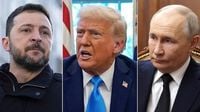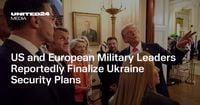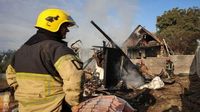In the heart of Washington, D.C., senior military leaders from the United States and several European nations convened this week to finalize a series of military options for Ukraine, a move that signals a new phase in the West’s ongoing response to Russia’s invasion. The high-stakes deliberations, which included chiefs of defense from the US, Finland, France, Germany, Italy, the United Kingdom, and Ukraine, underscored both the urgency and complexity of providing Kyiv with credible security guarantees as the war grinds into its fourth year.
According to Reuters, these options will soon be presented to each nation’s national security advisers for further consideration as part of broader diplomatic efforts. The US military confirmed in a statement, “These options will be presented to each nation’s respective national security advisers for appropriate consideration in ongoing diplomatic efforts.” The proposed measures range from deploying European forces to Ukraine under US command and control, to expanding US air support—potentially through additional air defense systems or even the enforcement of a no-fly zone with American fighter jets.
This flurry of activity comes on the heels of intense talks between Ukrainian President Volodymyr Zelenskyy and Western leaders in Washington. As reported by ABC, Zelenskyy emerged from these meetings with the promise of “security guarantees” from his allies—military help intended to protect any future peace agreement with Russia. The Western leaders’ commitment was clear, but questions lingered about the substance of these guarantees and whether they would be enough to deter further Russian aggression.
“We need strong security guarantees to ensure a truly secure and lasting peace,” Zelenskyy wrote on Telegram, according to ABC. One of his key conditions for signing any peace deal with Moscow is robust Western support for Ukraine’s military, including weapons, training, and, crucially, troops to help shore up its defenses.
The concept of a “reassurance force” has gained traction among European allies. French President Emmanuel Macron and British Prime Minister Keir Starmer have both publicly supported the idea of deploying European troops to Ukraine as part of a “coalition of the willing.” German Chancellor Friedrich Merz has also indicated that Germany could participate, though not without reservations. The head of Germany’s soldiers’ union cautioned, as cited by Reuters, that “European NATO leaders must not be naive when discussing a Ukraine peace force” and warned that a long-term deployment could require tens of thousands of troops—no small commitment for any nation.
Canada and Australia have also floated the idea of sending peacekeeping forces, broadening the coalition to include countries beyond Europe. In total, some 30 nations, including Japan and Australia, have signaled support for the initiative, according to ABC. Still, the Kremlin has repeatedly rejected the notion of NATO troop deployments, with Russian Foreign Minister Sergey Lavrov declaring that security arrangements for Ukraine without Moscow’s involvement are “pointless.”
President Donald Trump, meanwhile, has sought to thread a fine needle. He has ruled out sending US ground troops to Ukraine, but left the door open to other forms of military involvement. In his own words, as quoted by ABC, “When it comes to security, they’re (Europe) willing to put people on the ground. We’re willing to help them with things, especially, probably, if you talk about by air, because nobody has the kind of stuff we have.” Trump has described the US role as providing “air support,” positioning Europe as the “first line of defence” and suggesting “Article 5-like” protections—referring to NATO’s collective defense clause—could be possible, though details remain vague.
The prospect of US air support is stirring debate among military analysts. Kristine Berzina, a senior fellow at the German Marshall Fund, told AFP that American air involvement would be an “incredible green light for greater ambition” by European allies. US air support could take several forms: supplying more air defense systems, enforcing a no-fly zone, or assisting with air policing. But each option carries significant risks. As noted by ABC, NATO has previously denied requests for a no-fly zone over Ukraine, wary of being drawn directly into the conflict with Russia.
Stephan Fruehling, a defense expert at the Australian National University, told ABC that without a strong US presence, European security guarantees might end up being largely symbolic. “NATO generally doesn’t actually have that many land forces to spare,” he explained. “A few thousand Western Europeans are not going to make that huge of a difference, so it would be more symbolic.” He added that “the Europeans are obviously reluctant to do something like that without American support, in particular American commitments to help with air power.”
Matthew Savill, director of military services at the Royal United Services Institute, echoed these concerns, writing that “the Russians are unlikely to fear US airpower if they do not think it will be used against them.” According to Savill, Trump “has consistently been clear he does not see it as worth the US risk to confront Russia.”
The stakes could not be higher. As US and European officials met to hash out a plan, Russia unleashed one of its largest aerial attacks on Ukraine this year, firing nearly 1,000 long-range drones and missiles since the White House talks began, according to Ukrainian tallies cited by ABC. One particularly damaging strike targeted a gas compressor station in eastern Ukraine, a facility critical for filling storage sites ahead of the winter heating season, Reuters reported. Such attacks underscore the continued volatility on the ground and the urgency of credible security arrangements.
Despite the public show of unity among Western leaders, there is no consensus yet on the path forward. The details of any security guarantees remain unresolved, and officials caution that it will take time to define arrangements that are both militarily effective and politically acceptable to Moscow. Russia, for its part, continues to insist that its invasion is a “special military operation” aimed at defending national security against NATO’s eastward expansion—a justification flatly rejected by Kyiv and its allies, who see it as a thin cover for territorial conquest.
Diplomatic efforts are ongoing. Trump has said there is an agreement for a bilateral meeting between Zelenskyy and Russian President Vladimir Putin, but only after senior officials hammer out the key issues. Zelenskyy has made it clear he will not sit down with his Russian counterpart until his allies agree to security guarantees, calling for clarity on the “architecture within seven to 10 days.”
As Professor Fruehling put it to ABC, “The term security guarantees is widely used, but who’s actually guaranteeing what here? Nobody can guarantee Ukraine’s security because ultimately only the Russians can do that.”
In the end, the fate of Ukraine’s security—and the credibility of Western promises—may hinge as much on Moscow’s willingness to negotiate as on the strength of any Western coalition. For now, the world waits as diplomats and generals alike search for a formula that can bring lasting peace to a battered nation.



